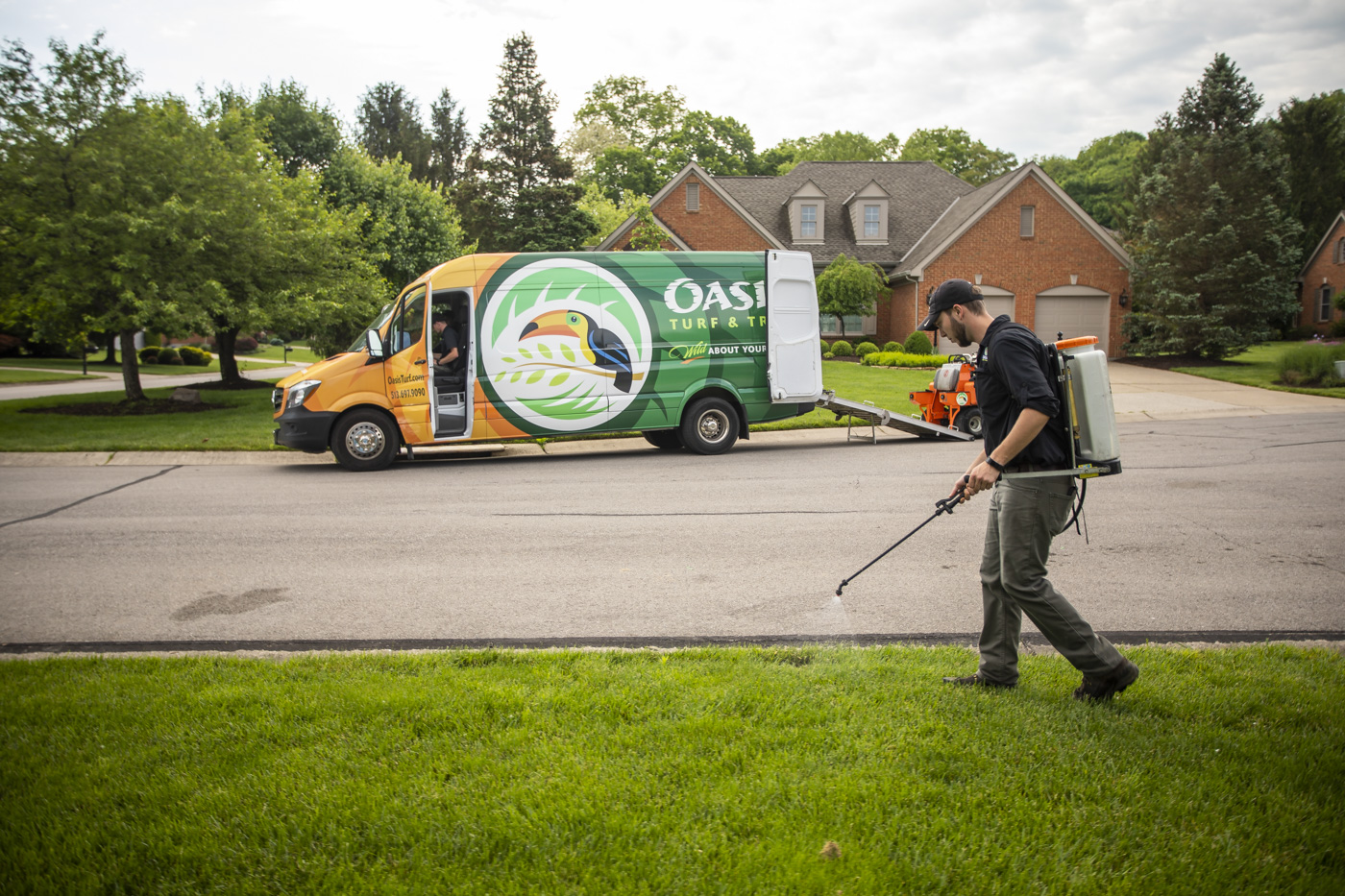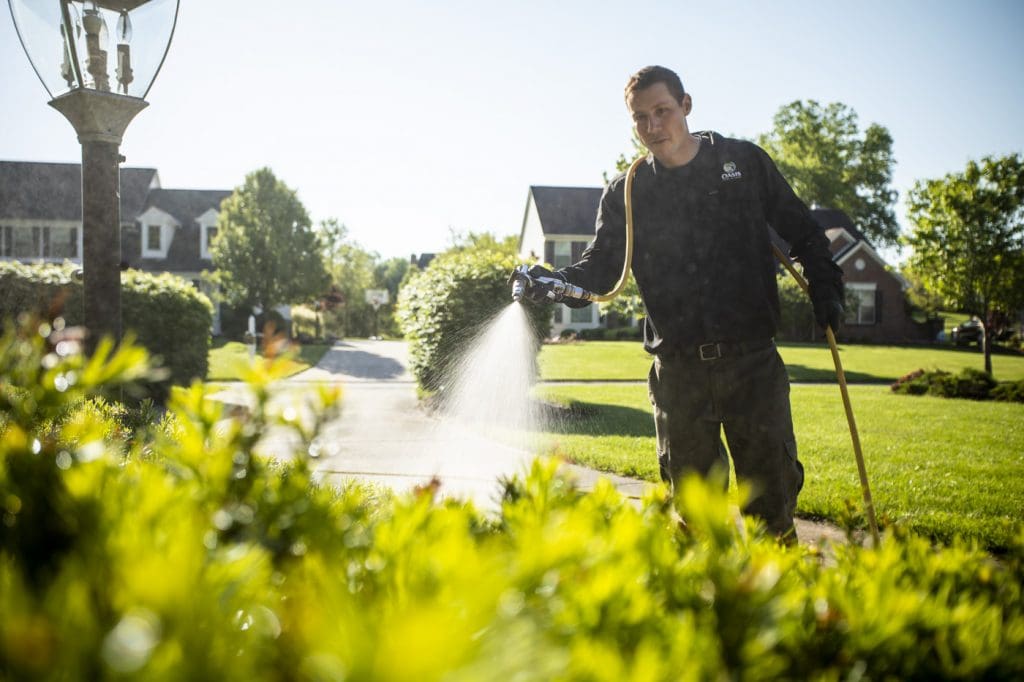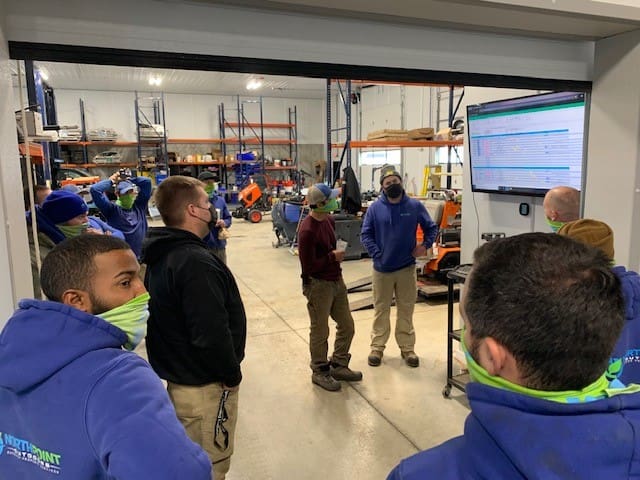
Landscape business owners who take training seriously know that it’s not only a way to ensure that team members maintain a high standard (which in turn builds the company’s reputation), but it’s also a way to boost safety, build a strong workplace culture, and even recruit great people.
Oasis Turf & Tree in Loveland, Ohio, believes that training can be a differentiator when it comes to hiring. Company owner Rob Reindl, LIC, says that they’re seeking employees who are interested in becoming long-term team members — not viewing a lawn care technician job as a “stop” on their career path. A primary way that they do this is by offering a lot more training than most companies in their area.
“We go well beyond the state-required bare minimum,” says Reindl. “The bare minimum mandatory training in Ohio requires a day of in-house training. But we also have new lawn care technicians shadow current team members in the field. We also aim to get all of our lawn care technicians licensed even though the law requires that only one person on our team hold that license. Our goal is to have new technicians earn their Ohio Department of Agriculture license within 90 days of employment. Currently, around 95 percent of our staff is licensed.”

Reindl says that Oasis incentivizes team members to complete training with raises. They receive their first raise when they earn their Ohio Department of Agriculture license. They earn a second raise when they earn their NALP Lawn Care Technician certificate. Earning their NALP Certified Horticultural Technician certificate comes with a third raise.
“A lot of new hires haven’t been expected to go through this much training before so it can be intimidating at first,” Reindl continues. “That’s why our support is so important. We make sure that team members are set up for success by giving them the time and resources they need to study for these exams and earn these additional certifications.”
Oasis also hosts an annual internal conference called The Oasis Turf & Tree Summit to kick off each new season. This includes opportunities for different team members and managers to speak on topics they are interested in — and goals that are important to them for the year.
Attending industry events is also important to Oasis Turf & Tree. The entire team also attends The Ohio State University Agronomic Field Day as well as the Tri-State Green Industry Conference. The team also regularly attends GIE+EXPO and NALP’s co-current LANDSCAPES event. While many companies might send one or two people to these types of events, Oasis believes it’s beneficial to make it a team activity.
Don’t Let Training Become Stagnant
Doug McDuff, president of Landscape America in Wrentham, Massachusetts, says that training must be ongoing and ever-changing in order to be most effective. There are always going to be new issues that arise that warrant refreshers. But ongoing training also ensures that team members retain information.
Landscape America hosts weekly morning meetings that include a safety talk, a refresher on best practices and protocols, and a quick session on a “plant of the week,” meant to boost horticultural knowledge on a particular species. Separate from those weekly training sessions, the company also hosts weekly foreman meetings focused on highly specific field tasks.
“For example, we might cover bed edging, driver safety, planting techniques, or snowplow repair,” McDuff says. “Topics fluctuate throughout the season depending on the services we are providing.”
The company takes advantage of downtime, too. During the off-season, McDuff says the crews will gather at local garden centers to cover botany topics and horticultural tips and tricks. Hardscape crews have also spent time at the nearby Unilock plant for training on interlocking brickwork. All of this provides additional hands-on learning opportunities that enhance team members’ knowledge and experience.
“We also believe in one-on-one meetings,” says McDuff. “We have these regularly with the managers and leadership team and we encourage them to run their job sites autonomously. We’re here to provide the training support that our team needs — but we’re not micromanagers. Empowering our company’s leaders is really important.”
Branding Training and Making It Your Own

In Derry, New Hampshire, North Point Outdoors has gone as far as branding their training efforts. North Point Outdoors University is the company’s formal training program. Co-owner Andrew Pelkey says that formalizing the process is helping to ensure that certain standards are met — and that everyone receives the same level of training. The company has partnered with Greenius, an online training system, to take employees through a designated course curriculum. New employees receive a Greenius account as part of the onboarding process. They then need to complete a series of modules before they can “graduate” from North Point Outdoors University.
“One thing that we’re focused on is going beyond just the ‘how-to’ aspect of using equipment, but actually delving into best practices,” Pelkey explains. “Of course, we want crews to know how to operate the equipment properly. But we also want to make sure that they’re implementing practices that differentiate us from the competition and set the bar higher.”
A big portion of the training program will include videos, which Pelkey is in the process of making. He says it’s important to remember that some people are visual learners. Plus, it’s an opportunity to showcase those best practices that North Point wants to make sure their team members are following.
“The videos also give people an opportunity to view ‘refreshers’ when they need them,” Pelkey says. “As a seasonal business, we’re aware that there can be long time-lapses of downtime. We always want to make sure that skills and best practices are fresh when we start a new season.”

